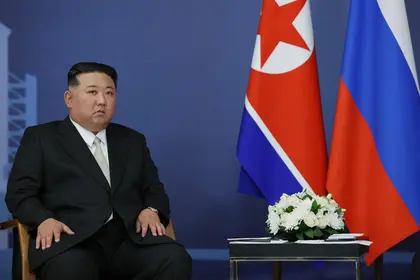North Korea successfully tested a new tactical ballistic missile capable of carrying a super-large warhead, state media said Tuesday, with analysts suggesting the weapon could be nuclear-capable.
Pyongyang's state media claimed it had successfully launched the Hwasongpho-11Da-4.5 missile, which it said was capable of carrying a 4.5 ton-class super-large warhead.
JOIN US ON TELEGRAM
Follow our coverage of the war on the @Kyivpost_official.
"The test-fire was conducted with a missile tipped with a simulated heavy warhead to verify flight stability and hit accuracy at the maximum range of 500 kilometres (310 miles) and the minimum range of 90 kilometres," the North's Korean Central News Agency (KCNA) said.
It added that it would test fire the missile again this month "to verify flight characteristics, hit accuracy and explosion power of super-large warhead at the medium range of 250 kilometres".
But Seoul's military said Pyongyang's claims of a successful test were likely a "lie", pointing to the fact that one of the missiles appeared to have failed in the early stages of flight.
That missile's trajectory suggested a possible mid-air explosion over North Korea, the military has said, which could have led to debris falling on the country.
"It is extremely rare for test launches to be conducted inland, and the claim that they succeeded in such a launch is likely to be false," Joint Chiefs of Staff spokesperson Lee Sung-jun told reporters Tuesday.
A super-large warhead, along with a spy military satellite and solid-fuel intercontinental ballistic missiles, was among the advanced weapons that North Korean leader Kim Jong Un vowed to develop at a party congress in 2021.

North Korea’s Kim, Russian Minister Agree to Boost Military Ties
In the KCNA report, the weapon was "described as a 'super-large warhead', deliberately omitting the word 'nuclear'", Hong Min, a senior analyst at the Korea Institute for National Unification in Seoul.
"But since it is capable of carrying a nuclear warhead, it can be considered a nuclear weapon," he told AFP.
- 'Fatal consequences' -
The Monday test launches took place after Kim's regime denounced the latest joint military exercises by Seoul, Tokyo and Washington as an "Asian version of NATO" and warned of "fatal consequences".
Relations between the two Koreas are at one of their lowest points in years, with the North ramping up weapons testing while bombarding the South with balloons full of trash.
Pyongyang says those missiles are in retaliation for balloons loaded with anti-regime propaganda leaflets sent northwards by activists in the South.
In response to the North's repeated launches, South Korea has fully suspended a tension-reducing military treaty. It also briefly resumed propaganda loudspeaker broadcasts.
On Tuesday, South Korea's military said it had resumed live-fire exercises at artillery ranges near the border with the North.
At front-line ranges within five kilometres of the Military Demarcation Line (MDL) that runs through the middle of the DMZ separating the two Koreas, South Korean troops fired around 140 rounds using the K9 and K105A1 self-propelled howitzers, it added.
Last week, South Korea's Marine Corps also resumed live-fire exercises on islands near the western inter-Korean border, the first such exercises since the 2018 tension-reducing military deal with the North was fully suspended in June.
South Korea has also grown anxious over the North's warming relations with its isolated neighbour Russia.
North Korea is accused of breaching arms control measures by supplying weapons to Russia to use in its war in Ukraine, and Russian President Vladimir Putin held a summit with Kim in Pyongyang last month in a show of unity.
You can also highlight the text and press Ctrl + Enter






